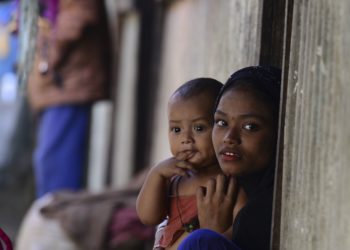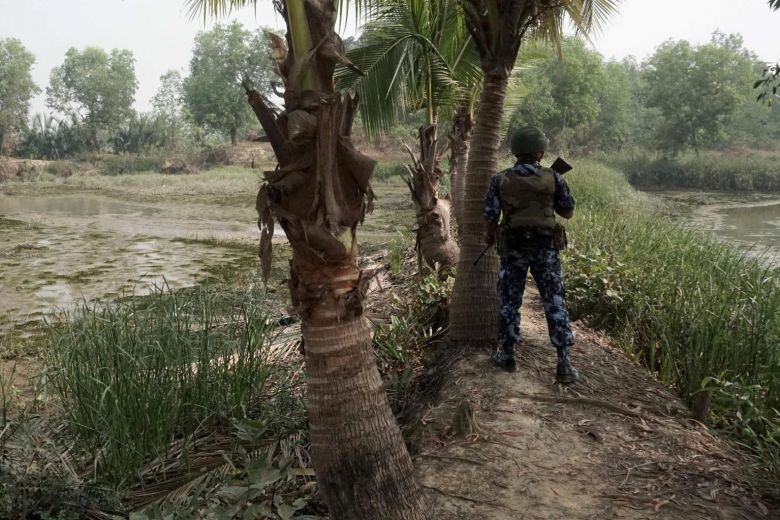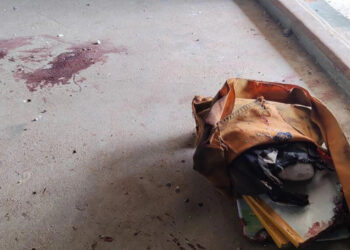NEW DELHI, India – Inside a tin and polythene covered shanty that has been turned into a grocery shop, Mohammad Ismaeil, a 27-year-old Rohingya Muslim refugee, sits on a wooden table. He is surrounded by boxes of candies, biscuits and a few packets of cigarettes, which he sells to feed his wife and three children.
Mr. Ismaeil, who now lives in a rented hut in the Madanpur Khader district of New Delhi, came to the Indian capital after he had to flee his home in Myanmar. Mr. Ismaeil left the Buthidaung district of Rakhine State and crossed the West Bengal border in 2014, running for his life after his mother was killed by the Myanmar army.
Over the past three years, he has tried different types of work. First he sold trash, then he took up labor at a private construction site. Eventually he became a shopkeeper in the slum, earning three to five dollars a day.
As Mr. Ismaeil sits on the table, his friend and fellow refugee, 31-year old Mohammad Ali comes rushing into the shanty to inform him about the latest developments in a Rohingya deportation case heard at the Supreme Court of India.
Mr. Ismaeil looks tense and lights up a cigarette. “The court has passed an order not to deport us for now,” Mr. Ali said. The news brought some relief to Mr. Ismaeil, but he said he was afraid the ruling right-wing Bharatiya Janata Party may still go ahead with its plans to deport refugees.
“They [the central government] have been accusing us of being a security threat and somehow they will justify their stand in the court,” Mr. Ismaeil told The Globe Post.

On August 19, the Union Ministry of Home Affairs issued a circular asking all states to identify and deport illegal Rohingya immigrants.
“Illegal migrants are more vulnerable for getting recruited by terrorist organizations. Infiltration from the Rakhine State of Myanmar into Indian Territory, especially in the recent years, besides being a burden on the limited resources of the country also aggravates the security challenges posed to the country,” the document read.
At present, there are more than 40,000 Rohingya Muslim refugees living in four Indian states: Jammu, Haryana, Rajasthan, and Delhi.
Junior Interior Minister Kiren Rijiju said in August virtually all of them are in India illegally.
“As far as we are concerned they are all illegal immigrants. They have no basis to live here. Anybody who is illegal migrant will be deported,” he said.
Thousands of Rohingyas fled Myanmar during a spike of violence some five years ago. They arrived in India with hopes for peace and security. At first, the refugees were well-received by the locals, but hostility gradually increased.
Indian authorities voiced concerns that Rohingya Muslims could become a threat to the country’s security and national interests and negatively affect its working class and the economy.
In September, the Indian Home Ministry submitted an affidavit saying it could share intelligence information with the Supreme Court that would prove Rohingya links to Islamic State and Pakistani militants.
Rohingya say the allegations are government propaganda used to justify Prime Minister Narendra Modi‘s plans for deportation.
“These are all lies. How can we be a threat, when we are ourselves in grave danger of being killed by our own state,” Mr. Ismaeil said.
The BJP’s rise to power coincided with an upward trend in violence against India’s minority communities, mostly targeting Muslims who constitute 14.2 percent of the population.
It is widely regarded that the BJP is being mentored by Rashtriya Swayamsevak Sangh, an Indian right-wing, Hindu nationalist volunteer group which believes in the idea of a Hindu Rashtra, or nation. It has shown open antagonism against the Muslim populace, including the Rohingya.
Haleema Khatoon, 48, who fled Myanmar for India in 2012, believes her religion plays the main role in the deportation case.
“They would never deport me if I was a Hindu,” Ms. Khatoon told The Globe Post. “We are Muslims and that is the only reason for our deportation because the present government is anti-Muslim. All other allegations are just a cover up to justify their actions.”

The narrative of Rohingya being a security threat was initially supported by the BJP unit of Jammu and Kashmir. The Regional Jammu Kashmir National Panthers Party later joined the cause.
At present, there are around 1,219 Rohingya families living in the Jammu district of Jammu and Kashmir state. They comprise over 5,700 people who live as refugees in dozens of slum dwellings across different areas.
Jammu and Kashmir state disputed by India and Pakistan, and some of the local residents have joined militant ranks to fight for the independence of the region.
BJP leaders in Jammu have said Rohingya were being used by the Kashmiri militants and could also potentially join ISIS or spy for Pakistan’s Inter-Service Intelligence agency.
At the same time, JKNPP said Rohingya were a threat to the demography of Jammu, which is a Hindu-majority region. In February, the party set up billboards across the area calling for Rohingya and Bangladeshi refugees to leave the city.
In January, the state’s Chief Minister Mehbooba Mufti said there were 5,700 Rohingya living in the region, but there was no indication of them being radicalized. No Rohingya were found to be involved in militancy-related incidents, she added.
“The allegations of us being a security threat are totally false,” Mohammad Younus, a 44-year-old Rohingya man from Narwal told The Globe Post. “Show us a single incident, which can prove our role in any illegal activity and even government says this.”
“We are just dragged again and again into the controversies, so as to paint us bad and turn Indian people against us. We are just reduced to political objects so that they can get votes.”

Mohammad Ali, who was a teacher in Myanmar and has become a mason in New Delhi, has also refuted claims that Muslim refugees are a threat to India’s security and economy.
“I am not a terrorist, but a common man like every other Indian who is struggling hard to survive,” Mr. Ali told The Globe Post. “We are not asking for government jobs or any other facilities but only a little more time to live [here] until the Myanmar government arrives at a solution on Rohingyas.”
At the age of 57, Dil Mohammad is the head of 60 Rohingya families living in Shram Vihar locality of South Delhi. He told The Globe Post that he has seen growing hostility against refugees.
“We were living a normal life, but since last year, we are being dragged again and again in controversies. We are being used as a political bait,” he said. “How can they expect us to be a threat to a country and its people who gave us the place to live when we were being killed and slaughtered?”
On October 13, during a hearing on the petition filed by Rohingya refugees against the central government, the Supreme Court of India sought to strike a balance between humanitarian consideration for the asylum-seekers and authorities’ concerns that they could pose a threat.
“There cannot be an iota of doubt that there has to be a broader humanitarian approach to the issue which has come before the court for the first time. But national interest cannot be kept secondary. A balance has to be struck,” the Supreme Court Bench said.
The court will hold another hearing on November 21. For the refugees, the decision could be a matter of life or death.
“Here even though we struggle to find work but at least we are alive. If the government wants to send us back, then they should gather us at one place and shoot us down,” Mr. Ismaeil said. “It is better to die here than in Myanmar.”




















